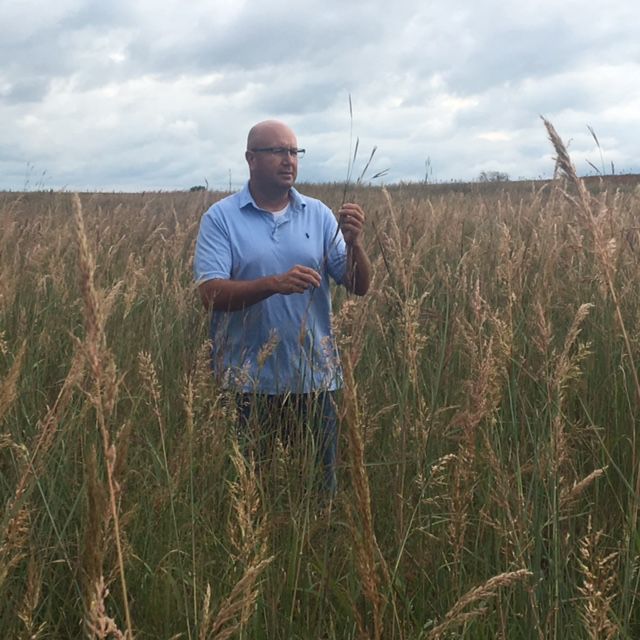Back injury kick starts Nebraska farmer into making changes to save his soil and his farm
Nearly 150 years after his great-great-grandfather first sunk a plow into the virgin Nebraska prairie, Del Ficke is trying to make amends.
It’s not what God intended, he said.
“There’s soil health and soil hell,” he said. “What we were doing was soil hell.”
This hell, as he puts it, spreads across the Great Plains. Generations of farmers have been mining the soil of its fertility, he said. He points out what could happen, looking back centuries to civilizations that once had an abundance of the high-productive earth.
“Now they are deserts,” he said. “We are doing that here, too.”
Up until a decade ago, Ficke was one of them.
But now, 14 miles south of Lincoln, just outside of Pleasant Dale, population 210, Ficke, 51, the fifth generation, is trying to save his farm for the future by saving his soil.
Ficke became faithful in the regenerative agriculture movement. He shrunk his operation from 7,000 acres to 700 acres. He downsized his fleet of machinery and cut back on chemicals and fertilizers. Moreover, he implemented cover crops and cattle across all his farm ground.
And, he said, he is 70 percent more profitable.
“Soil should be on the endangered species list,” he said. “The soil is on life support, and man has done that.”
Del’s story
For years, Ficke farmed alongside his father, Kenneth, and a cousin, expanding their operation along the way. The family began no-till farming in 1987 and soon implemented cover crops for cattle feed.
However, Ficke’s life changed in 1999 when a series of back problems caused him to make a career change. He couldn’t handle the labor of farming and went back to college and entered the medical field. He managed a clinic in Lincoln for several years.
The experience was an eye-opener. Clinic patients, realizing he had a farming background, would ask him questions about how their food was grown.
“I started hearing a little different side of what people thought about agriculture,” he said. “Certainly some didn’t have the right facts. But some were right on target.”
Making changes
“In my past, we’ve done a lot of things on a large scale and a lot of things wrong,” he said. “Now we are trying to relearn what we thought we knew and help others in the process.”
Sign up for HPJ Insights
Our weekly newsletter delivers the latest news straight to your inbox including breaking news, our exclusive columns and much more.
Agriculture has always run deep in Ficke’s genes. Around 2007, he began to make a transition back to full-time farming, but not the way he had farmed in the past.
Instead, he took a “modern holistic, sensible and profitable approach that is both modern and historically-based in both concept and philosophy,” he said
Ficke cut his rented acres and on his family’s 700 acres he grows corn, soybeans, sorghum and wheat. He also has about 100 cows.
It’s better on his health, he said of his new way of farming. It’s also better for the soil.
Cover crops have helped build the soil’s organic matter, increase water infiltration and suppress weeds, thus helping cut back on chemical use.
“There is only one mistake you can make on cover crops, and that is not planting them,” Ficke said. “People get so hung up on the mixture so much they don’t get it drilled. Whatever they put out there is better than not planting them.”
But cover crops only go so far without animal impact. Row-crop acres are put into season-long cover crop grazing, along with the use of native pastures for his cattle.
Ficke mob grazes, moving cattle once or twice a day, or every few days, across his pastures and cropland.
Cattle produce 75 to 100 pounds of urine and manure a day, he said.
“God created them to be foragers and their manure to be the nutrients,” he said.
Ficke grazes his own patented breed of cattle, the Graze Master, a forage-efficient composite breed with a bloodline that includes Red Angus, Simmental and Hereford, along with others.
“The cross works great and the taste and tenderness is amazing,” he said.
The smell of soil
Ficke said he loves to put his hands in the soil and see his success.
“Holding good soil, soil that still smells beautiful, it definitely changes you,” he said.
On one field where cattle have been heavily integrated, organic matter has gone from 2.6 percent to 6.9 percent. On that same field water infiltration is at 13 inches an hour.
Meanwhile, in other fields, organic matter has increased from 1.5 to 4 percent.
“The spade is the only tillage equipment you need,” Ficke tells people.
Ficke, considered a regenerative pioneer, is now consulting across the country on transitioning farms and ranches in a more holistic manner.
Every farm is different, he stressed.
“People want me to write down a prescribed program for what we are doing,” he said.
“The second you write it down, you are going to throw out all the advantages. It can’t be a cookie-cutter program that you are going to do something exactly this way or that way.”
He recommends following regenerative veterans like Gabe Brown and Ray Archuleta. Ficke suggestions rookies might want to start out slow—maybe making a change to 10 percent of the farm.
“Maybe it is one field, one practice with cows, the elimination of one piece of equipment,” he said. “It could be anything. The 10 percent could come from anywhere.
“If everyone would just change their operation a little, we can make a difference,” he said.
Amy Bickel can be reached at [email protected].



